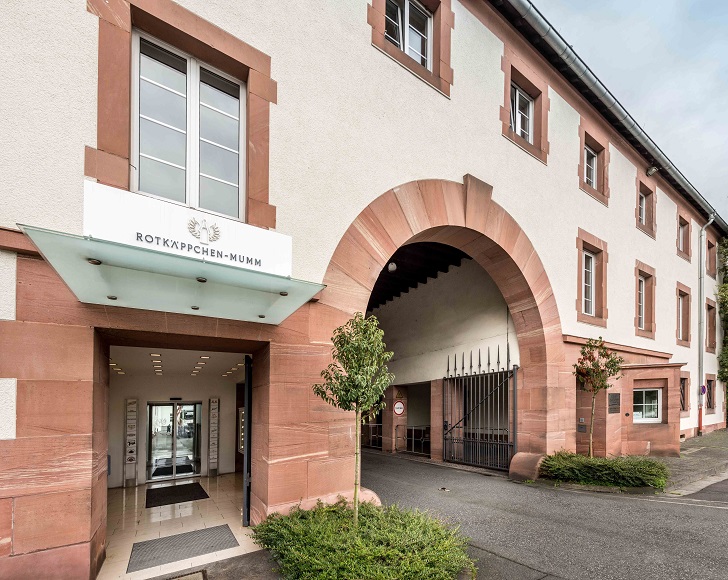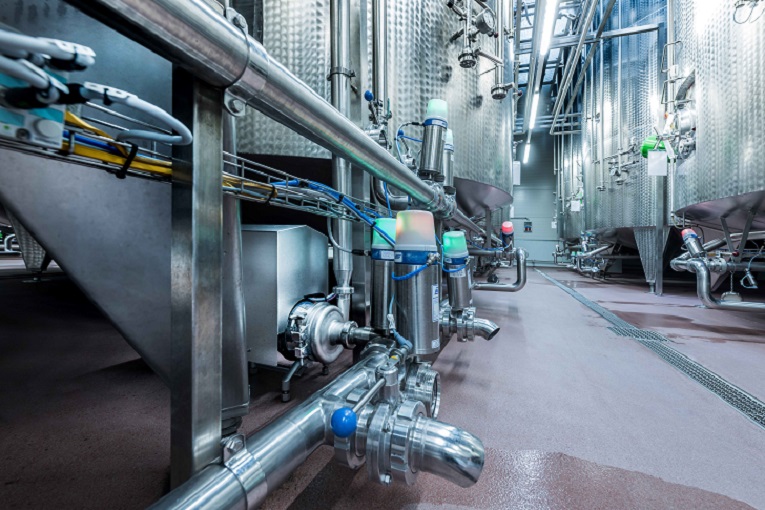

When a German wine producer built a new processing plant to produce alcohol-free sparkling wine, the project had demanding hygienic requirements. Vitacast single-stage centrifugal pumps from KSB were chosen on the basis of their reliability, price-performance ratio, durability, maintenance intervals and ease of servicing.
The development of an alcohol-free sparkling wine by Rotkäppchen-Mumm beverage company in Eltville Germany marked the company’s foundation for their successful entry into the alcohol-free drinks market back in 2008. However order to capitalise on the development, its production process, unique in Germany, required a new processing plant and new production building. So it was in 2014 that work commenced on constructing a new production building at Eltville.
The planning
As is to be expected the planning and development of the new plant for the production posed a major challenge that could only be overcome with real teamwork. But the effort was worth it: the processing system was working perfectly in time for the product launch in spring 2017.
"For us, this plant heralded a new era," remembers Joachim Engler, Head of Filling in Eltville and Technical Director at the Eltville and Breisach production facilities. Engler’s team had gathered experience with other production processes for alcohol-free alternatives to traditional sparkling wine, but not with the type of process required for the new beverage.
"Many changes had to be made at the planning phase and even during implementation. Every day of the project demanded a high degree of flexibility from everyone," says Engler.
The company’s goal was to create an alcohol-free sparkling wine offering the exceptional taste experience of the company’s established vintage quality. "We wanted to capture the aroma of wines with the best provenance," explains Thomas Krischke, Head of Production for Wines, Wine-Based Drinks and Alcohol-Free Beverages.
"We therefore applied a different process to that used for other products. The dealcoholisation system came from Australia and is normally used for capturing coffee aromas. Its special feature involves removing the alcohol from wines in three stages, whilst capturing the aromas, at a very gentle 34°C. By comparison, other dealcoholisation systems operate at double this temperature.
Partnership built on trust
Technical implementation of the complete system was handled by InfraServ Wiesbaden (ISW) Technik, a specialist for projects in the beverage industry. ISW Technik installed all tank piping and modified the bottle filling system. This involved not only supplying and assembling the product and heating system piping, but also carrying out extensive pipework on the tanks.
Although ISW Technik has plenty of experience with production systems for the wine and sparkling wine industry, this project represented something special even for them. "The system stands out due to the extent of its automation," explains Wolfgang Martin from Customer Management at ISW Technik.
"Many kilometres of piping had to be laid, and more than 30 tanks had to be connected with each other. The product flows are controlled by over 300 automated valves."
Another challenge was posed by the project’s demanding hygienic requirements. While its high alcohol content protects traditional sparkling wine against contamination, this is not the case for the alcohol-free variant. Special attention had to be paid to ensuring that all components, including pumps, employed hygienically suitable designs. This included CIP compatibility, i.e. the ability to operate with acid and alkaline media and withstand high temperatures.
Pump selection
ISW Technik recommended pumps from KSB on the basis of their reliability, price-performance ratio, durability, maintenance intervals and ease of servicing. Rotkäppchen-Mumm was very happy with this choice having already collaborated with the Frankenthal-based manufacturer in other production applications.
Twelve Vitacast pumps were specified for use in the new production plant’s tank farm. These pump all the liquids, including wine and alcohol-free products, within the system between the 27 tanks, and also to the filling systems.
The Vitacast single-stage centrifugal pump features wetted parts manufactured in stainless steel with a high-grade surface finish achieved via specialised polishing processes. These make it suitable for hygienically demanding applications and CIP/SIP processes.
The Vita series pumps employed have the certificates common to the industry, such as EHEDG, and their elastomer components conform to FDA standards. Their almost complete lack of dead volume makes them very easy to clean. At the same time they offer excellent efficiency levels thanks to an optimised hydraulic design and impellers matched to the required duty point.
In operation they have to comply with technical, automation and quality requirements encompassing pressure (between 8 and 20 bar), varying temperatures and flow rates between 5,000 and 20,000 litres a second. As demand is subject to fluctuation, all pumps are fitted with PumpDrive frequency inverters. These continuously adjust the speed to the actual demand of the system. As a result of the system’s extensive use of automation, all pumps are also equipped with a PROFIBUS PA interface.
Wine transportation
Two booster pumps transport the alcohol-free sparkling wine from the dealcoholisation system to the carbonisation stage, which requires an inlet pressure of 3.5 bar. These booster pumps are also flushed with water at 95°C as part of the CIP process.
Another Vitacast pump handles loading the alcohol tank truck, as the alcohol extracted by the system is delivered to a sister company Nordhäuser Spirituosen for further processing. Since their installation the system’s pumps have operated impeccably and reliably.
Beyond the technical demands, ISW Technik was above all looking for flexibility. "For this project we needed partners capable of offering quick and reliable delivery," comments Martin.
"When running a project, we always recommend the best technical solution, as long as this makes economic sense. But ultimately we bear responsibility to our customers for completing the project reliably and punctually. And if I know that a project run with KSB is going to work, then that is who I will turn to."
In selecting the food-approved pumps for the project, Martin completely put his faith in KSB’s expertise. "I’m no pump specialist – that is KSB’s job," says Martin. "In this highly specialised project, as in any other, they offered us support in pump selection and the use of optimum materials.
We particularly appreciate the honest feedback we get from KSB. The result of such useful feedback is much closer collaboration, which always has a positive effect if time becomes an issue."
Conclusion
The production system has been running smoothly since the start of 2017, and the new entry into the premium sector Mumm Dry Alcohol-Free was successfully launched in March 2017.
Today, some six million litres of alcohol-free sparkling wine are bottled a year, with the volume rising. The plant was initially configured to produce large quantities of alcohol-free sparkling wine. However, the system is also being used to produce eight million litres of wine-based mixed drinks, such as Rotkäppchen Fruchtsecco, which are available in various flavours.
This development also had a major impact on system planning, demanding flexibility during the implementation phase. "The system allows us to produce both large and small quantities depending on the requirements of the market. We can remain extremely flexible in terms of the pumps, the tank and piping, and the automation. We are happy that ISW Technik and KSB undertook this challenge with us," says a contented Engler.
The partnership and collaboration between ISW Technik and KSB have also been strengthened by the project. Consequently, it is hoped that absolute reliability, quick response times and short delivery periods on the part of KSB will help drive forward future collaborations.





